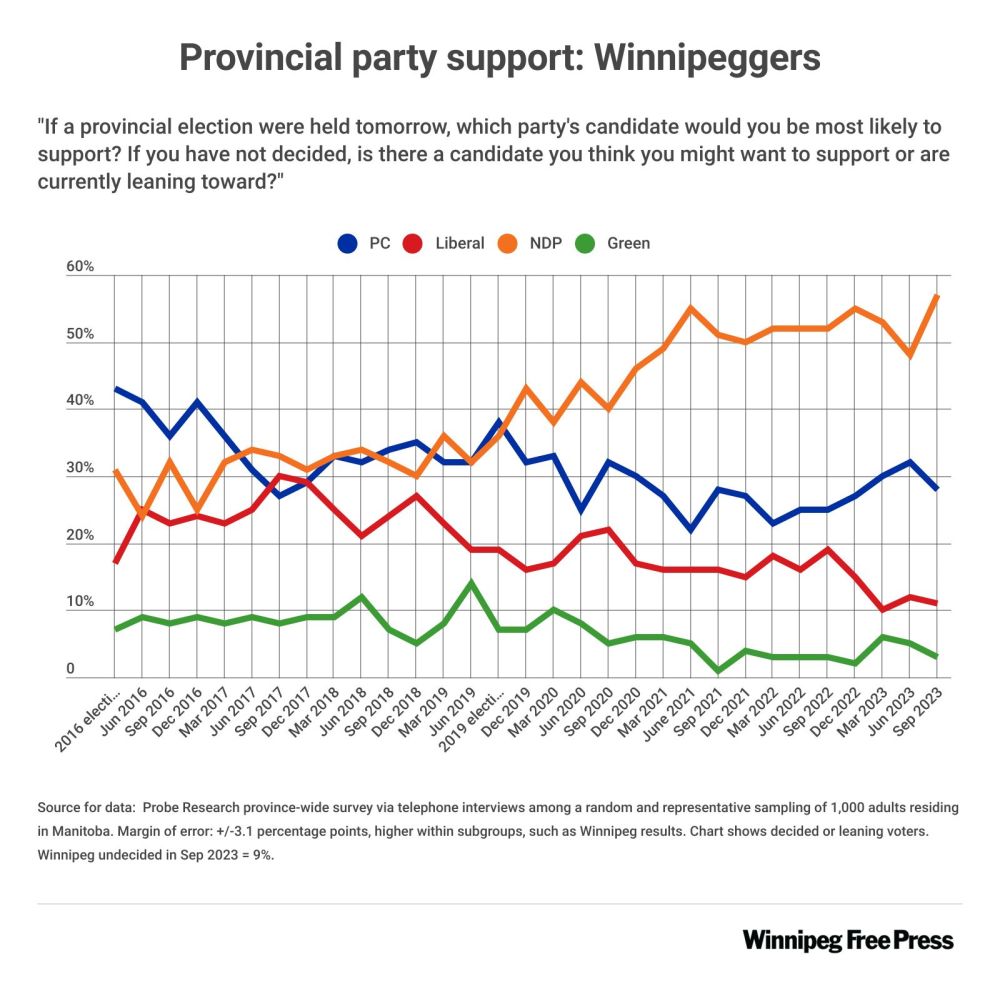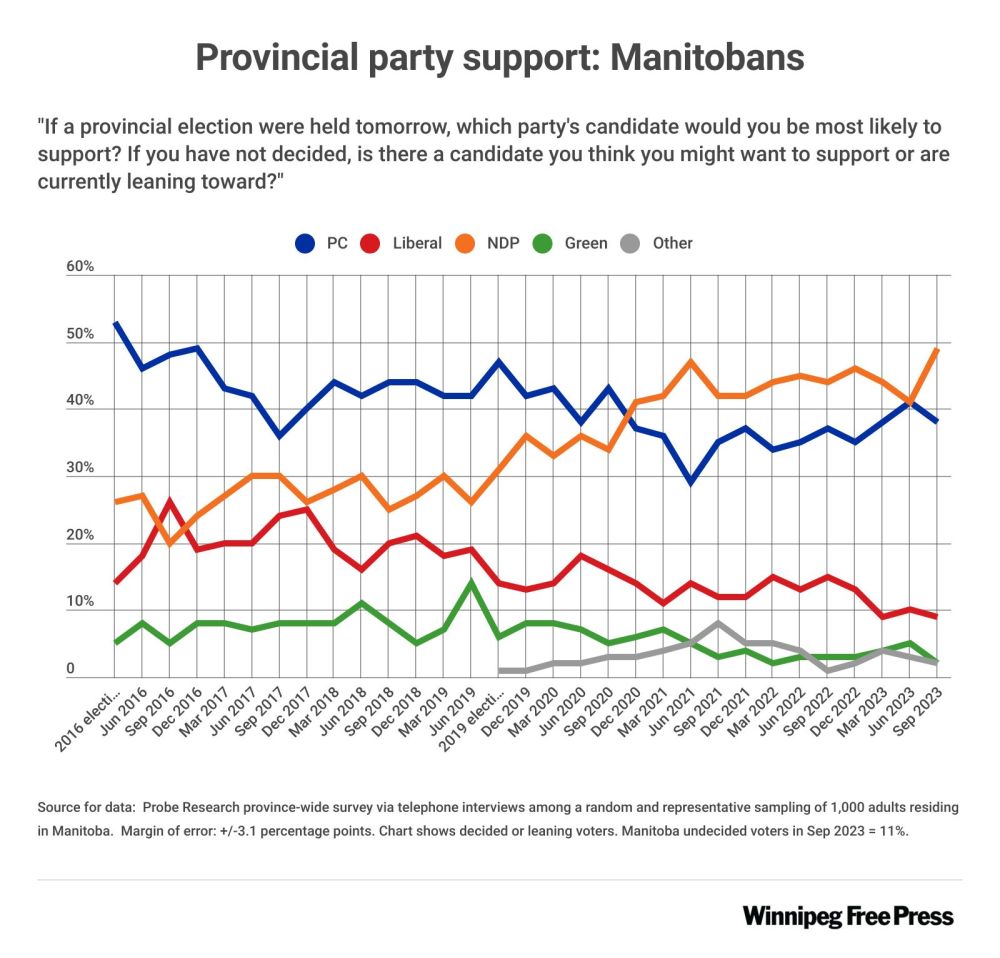Tories appear unable to pull out of tailspin seven years after Pallister filed flight plan
Advertisement
Read this article for free:
or
Already have an account? Log in here »
To continue reading, please subscribe:
Monthly Digital Subscription
$0 for the first 4 weeks*
- Enjoy unlimited reading on winnipegfreepress.com
- Read the E-Edition, our digital replica newspaper
- Access News Break, our award-winning app
- Play interactive puzzles
*No charge for 4 weeks then price increases to the regular rate of $19.00 plus GST every four weeks. Offer available to new and qualified returning subscribers only. Cancel any time.
Monthly Digital Subscription
$4.75/week*
- Enjoy unlimited reading on winnipegfreepress.com
- Read the E-Edition, our digital replica newspaper
- Access News Break, our award-winning app
- Play interactive puzzles
*Billed as $19 plus GST every four weeks. Cancel any time.
To continue reading, please subscribe:
Add Free Press access to your Brandon Sun subscription for only an additional
$1 for the first 4 weeks*
*Your next subscription payment will increase by $1.00 and you will be charged $16.99 plus GST for four weeks. After four weeks, your payment will increase to $23.99 plus GST every four weeks.
Read unlimited articles for free today:
or
Already have an account? Log in here »
Hey there, time traveller!
This article was published 20/09/2023 (819 days ago), so information in it may no longer be current.
It’s not an all-out disaster for Manitoba’s Progressive Conservative party. But new poll numbers suggest that one is close at hand.
With less than two weeks to go before the Oct. 3 election, a Free Press-CTV News Winnipeg poll conducted by Probe Research show the NDP have the support of 49 per cent of voters provincewide, and a remarkable 57 per cent within Winnipeg.
When interpreting survey results, most pollsters will tell you the trend line is more important than the actual numbers. On that basis, the Tories are losing ground at an alarming rate.

The party clawed back some support in the first six months of this year, actually tying the NDP on a provincewide basis in the June Probe poll. The new survey suggests the PCs now are in a steep, downward spiral.
How did the Tory momentum stall? They’ve done a lot wrong, both in government and in this campaign.
Off the top, the PC campaign is burdened by an extremely unpopular leader: just over 60 per cent of respondents disapprove of Heather Stefanson’s performance, with 49 per cent strongly disapproving.
The Tories could have used the campaign to boost Stefanson’s brand. Instead, they’ve largely kept her under wraps while unveiling a series of seemingly desperate pledges.
The commitment to pass “parental rights” legislation — an attempt to mobilize anti-LGBTTQ+ social conservatives in south Winnipeg’s immigrant communities — seems to have angered more people than it enticed.
And then there is the unrelenting Tory focus on tax cuts.
While in government, the Tories had already excised $1.5 billion in annual revenue through cuts to various taxes. New campaign pledges could very well double that annual amount.
Given that the earlier tax cuts failed to win much support from Manitobans, it’s a wonder anyone in the Tory war room thought doubling down would win this election.
However, the biggest drag on the 2023 Tory campaign may have been authored six years ago when former PC premier Brian Pallister started a sustained war with public-sector unions.

Shortly after taking power in 2016, Pallister started starving core departments, implementing severe vacancy management and laying off thousands of public servants before passing legislation to freeze public-sector wages and then refusing to negotiate new contracts.
His campaign of contempt for unions may have been a huge hit with core Tory supporters, but it was based on a fatally flawed assumption.
Pallister clearly believed that union members have the same political bent as union leadership. That might be true in some smaller bargaining groups, but in the largest public-sector unions, members are much more politically diverse.
Pallister thought he was picking a fight with unions. In fact, he was picking a fight with public servants, many of whom supported his party in the 2016 and 2019 elections.
The NDP relied heavily on public-sector employees to win four majorities from 1999 to 2011. In 2016, however, there was a shift that saw an alarming number shun the NDP and vote Tory instead.
After seven years of contempt and disdain, it’s becoming increasingly obvious many of those public servants — along with other Manitobans who are tired of Tory austerity measures and tax cuts — are reversing course yet again. If nothing else, the strikes that hit Manitoba Liquor and Lotteries and Manitoba Public Insurance are proof that unionized public servants are fed up and spoiling for a fight.
The Probe poll found the PCs may lose the support of 30 per cent of the people who voted for them in 2019, with about half of those switching their support to the NDP. On the other side of the equation, the poll found the NDP is retaining more than 90 per cent of the voters who supported the party in 2019, while also picking up votes from about half of those who voted Liberal.
It’s impossible to say with certainty that all of the people abandoning the PC party and planning to vote for the NDP are public servants. But when you consider the NDP holds a 30-point lead in Winnipeg — home to tens of thousands of public servants — it certainly seems as if government employees are looking for some payback.
Does this poll provide an accurate picture of the final tally on Oct. 3? The history of general elections strongly suggests that predictions of landslide victories in mid-campaign polls often do not come to fruition.

David Lipnowski / The Canadian Press files
The biggest drag on the 2023 Tory campaign may have been authored six years ago when former PC premier Brian Pallister started a sustained war with public-sector unions.
In 2003, Gary Doer’s NDP had the support of 57 per cent of respondents to a Probe poll. The Tories, under the leadership of Stuart Murray, had only 28 per cent support.
Doer would still capture a very strong majority, winning 35 seats (an increase of three) and pulling just under 50 per cent of the vote. Murray’s Tories rallied a bit, but only won 20 seats, a net loss of four.
The headline in the Free Press the next day said it best: “No landslide.”
The reality that should send a shiver down the spines of Tory strategists is that this election is not about winning a landslide. it’s about winning 30 seats and forming a majority government.
And that now seems to be a greater possibility for the NDP.
dan.lett@winnipegfreepress.com

Dan Lett is a columnist for the Free Press, providing opinion and commentary on politics in Winnipeg and beyond. Born and raised in Toronto, Dan joined the Free Press in 1986. Read more about Dan.
Dan’s columns are built on facts and reactions, but offer his personal views through arguments and analysis. The Free Press’ editing team reviews Dan’s columns before they are posted online or published in print — part of the our tradition, since 1872, of producing reliable independent journalism. Read more about Free Press’s history and mandate, and learn how our newsroom operates.
Our newsroom depends on a growing audience of readers to power our journalism. If you are not a paid reader, please consider becoming a subscriber.
Our newsroom depends on its audience of readers to power our journalism. Thank you for your support.











